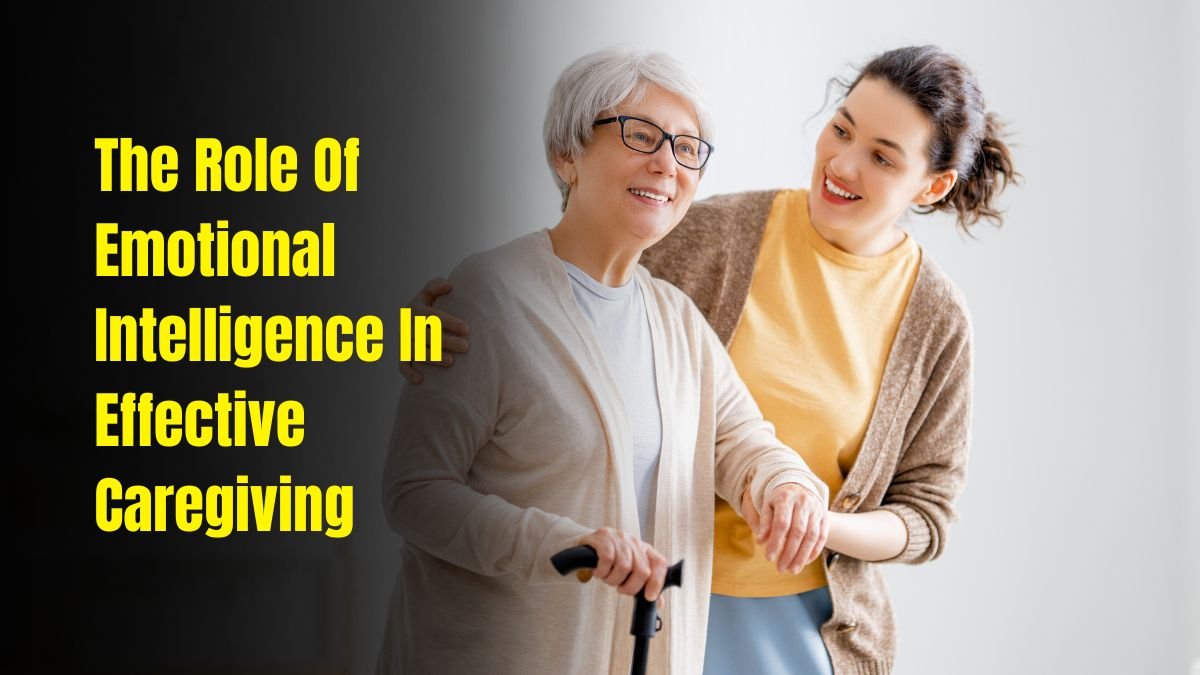In the heart of every caregiver’s journey lies not just skill and dedication but emotional connection. The ability to understand, manage, and respond to emotions—both one’s own and others’—is what truly defines effective caregiving.
This quality is known as Emotional Intelligence (EI), a cornerstone of compassionate, sustainable care that benefits both caregivers and care recipients alike.
As healthcare systems grow more complex and emotionally demanding, emotional intelligence has emerged as a vital skill. It allows caregivers to handle stress, build meaningful relationships, communicate effectively, and deliver care with empathy and understanding.
In this article, we explore the role of emotional intelligence in caregiving, the dimensions of EI, its proven impact, and actionable ways caregivers can enhance it.
Understanding Emotional Intelligence
What Is Emotional Intelligence?
Emotional Intelligence (EI) refers to the ability to recognize, understand, manage, and influence emotions. It encompasses skills that allow individuals to handle interpersonal relationships judiciously and empathetically.
Caregivers with high EI can interpret emotional cues, maintain composure during stressful situations, and offer reassurance to those in their care.
The Five Key Components of EI
- Self-Awareness – Understanding one’s emotions, triggers, and reactions.
- Self-Regulation – Managing stress, controlling impulses, and maintaining calm in tense moments.
- Motivation – Staying positive and focused even when facing caregiving challenges.
- Empathy – Understanding and responding to the emotions of patients or loved ones with sensitivity.
- Social Skills – Building and maintaining strong, trusting relationships through effective communication.
Each of these components plays a vital role in enhancing how caregivers interact, respond, and adapt to ever-changing emotional demands.
Why Emotional Intelligence Is Essential in Caregiving
1. Caregiving: An Emotionally Demanding Role
Caregiving—whether professional or familial—extends beyond physical assistance. It involves emotional labor, patience, and resilience. Caregivers often experience stress, fatigue, and frustration while balancing their own needs with those of the care recipient.
High emotional intelligence enables caregivers to regulate their emotions, avoid burnout, and maintain empathy even during tough times. It fosters patience, understanding, and compassion—qualities that define the caregiving experience.
Benefits of Emotional Intelligence in Caregiving
| Aspect | How Emotional Intelligence Helps | Impact |
|---|---|---|
| Stress Management | Helps caregivers stay calm and focused during high-pressure situations | Reduces anxiety and emotional exhaustion |
| Empathy | Enables better understanding of patient needs and emotions | Strengthens caregiver–patient trust |
| Communication | Encourages active listening and emotional awareness | Improves cooperation and care quality |
| Resilience | Enhances the ability to bounce back from emotional setbacks | Lowers burnout and compassion fatigue |
| Conflict Resolution | Promotes rational discussions and reduces emotional outbursts | Ensures smoother teamwork and family interactions |
Emotional intelligence not only improves the well-being of the patient but also safeguards the mental health of the caregiver.
The Connection Between Emotional Intelligence and Care Quality
1. Building Trust and Comfort
Patients often respond more positively to caregivers who display empathy and patience. Through emotionally intelligent communication—like active listening, eye contact, and gentle reassurance—caregivers create an atmosphere of trust. This emotional safety encourages cooperation and eases anxiety for those under care.
2. Emotional Regulation During Stressful Situations
Caregivers regularly encounter high-stress scenarios, such as medical emergencies or emotional breakdowns. Self-regulation, a key part of emotional intelligence, helps them stay composed, make sound decisions, and provide stability when emotions run high.
3. Empathy and Patient Outcomes
Empathy allows caregivers to sense distress or discomfort before it’s verbally expressed. For instance, a caregiver who recognizes signs of frustration or fear in a patient with dementia can respond with soothing words and calm body language, preventing escalation and enhancing care quality.
Emotional Intelligence as a Shield Against Burnout
1. Understanding Caregiver Burnout
Burnout occurs when caregivers are emotionally, mentally, and physically exhausted due to prolonged stress. Symptoms include irritability, emotional numbness, and decreased compassion. Burnout not only harms caregivers but also reduces care quality.
2. How EI Prevents Burnout
Emotionally intelligent caregivers are more self-aware of their limits and stress signals. They are better equipped to seek support, practice self-care, and use coping strategies such as deep breathing, reframing negative thoughts, or engaging in mindfulness activities.
| EI Skill | Application in Preventing Burnout | Result |
|---|---|---|
| Self-Awareness | Recognizing early signs of stress and emotional fatigue | Timely intervention before exhaustion |
| Self-Regulation | Managing negative emotions without lashing out | Stable emotional state |
| Empathy | Understanding patient emotions without absorbing them | Reduced emotional overload |
| Motivation | Finding purpose and meaning in caregiving | Sustained enthusiasm and morale |
When EI is developed, caregivers build emotional resilience, enabling them to recover faster from stress and maintain consistent, compassionate care.
How Emotional Intelligence Improves Communication
Effective communication forms the backbone of caregiving. A caregiver’s tone, expressions, and listening skills shape how patients perceive care.
1. Active Listening
Emotionally intelligent caregivers listen not just to words but also to tone and nonverbal cues. They respond thoughtfully, validating feelings rather than dismissing them.
2. Managing Difficult Conversations
When delivering sensitive information or calming upset patients, emotionally aware caregivers adjust their communication to the emotional state of the person they’re speaking with. This approach reduces conflict and strengthens trust.
3. Team Coordination
In professional care settings, EI enhances teamwork. Caregivers with high EI communicate effectively with colleagues, handle feedback positively, and resolve disagreements constructively—resulting in better outcomes for patients.
Emotional Intelligence and Empathy in Specialized Care
1. Dementia and Alzheimer’s Care
Patients with memory-related conditions often express emotions nonverbally. Emotionally intelligent caregivers can interpret these cues—such as agitation or withdrawal—and adapt their approach accordingly.
2. Pediatric and Special Needs Care
Children and individuals with disabilities may not always articulate discomfort or fear. Caregivers with high empathy detect subtle changes in behavior, helping deliver tailored emotional and physical support.
3. End-of-Life and Palliative Care
In emotionally intense settings, emotional intelligence allows caregivers to balance compassion with composure. Understanding grief and maintaining emotional boundaries helps them provide meaningful comfort without being overwhelmed.
Challenges in Developing Emotional Intelligence
Despite its importance, several barriers prevent caregivers from strengthening emotional intelligence.
1. Emotional Overload
Caregivers often absorb the emotions of those they care for, leading to compassion fatigue. Without self-regulation, emotional overload becomes inevitable.
2. Time Constraints
Heavy workloads and lack of breaks reduce opportunities for reflection and self-awareness, key components of emotional growth.
3. Lack of Training
Many caregiving programs emphasize physical skills over emotional competencies. Integrating EI education into training can bridge this gap.
4. Cultural Differences
Caregivers work with people from diverse backgrounds. Misreading emotional cues or norms can cause misunderstandings, making cultural awareness a vital part of emotional intelligence.
How to Develop Emotional Intelligence as a Caregiver
1. Self-Reflection Practices
- Keep a journal documenting daily emotional challenges and reactions.
- Reflect on situations that caused frustration or satisfaction and identify triggers.
- Use self-evaluation to understand personal emotional patterns.
2. Mindfulness and Stress Management
Mindfulness meditation helps caregivers stay present and emotionally balanced. Techniques like deep breathing, guided relaxation, or short breaks during work can enhance emotional awareness.
3. Training and Workshops
Professional development programs that focus on communication skills, empathy training, and conflict resolution help caregivers enhance emotional intelligence over time.
Building Support Networks
Regular discussions with peers, mentors, or supervisors create emotional outlets. Sharing experiences and coping strategies can reduce isolation and strengthen resilience.
4. Practicing Empathetic Listening
When interacting with patients or families, listen to understand rather than respond. Acknowledge their emotions with phrases like “I understand that this is difficult for you,” to validate their feelings.
5. Maintaining Emotional Boundaries
Caregivers must learn to separate empathy from over-identification. This balance preserves compassion while protecting mental health.
Emotional Intelligence in Leadership and Team Caregiving
Emotional intelligence is equally vital for supervisors and care coordinators. Leaders with high EI can:
- Motivate their teams through recognition and empathy
- Address conflicts constructively
- Encourage open communication and trust
- Create emotionally supportive workplace cultures
This not only enhances caregiver morale but also improves overall care delivery.
Real-Life Example: Emotional Intelligence in Action
Consider a caregiver assisting an elderly patient with Parkinson’s who grows irritable during medication routines. Instead of responding defensively, the emotionally intelligent caregiver:
- Recognizes the patient’s frustration as fear or discomfort.
- Maintains composure and speaks gently.
- Adjusts the environment to minimize stress (lower noise, slow pace).
- Reflects afterward to identify emotional triggers and better strategies for next time.
This simple shift in response demonstrates how emotional intelligence transforms care—reducing conflict and deepening mutual respect.
Key Statistics: The Impact of Emotional Intelligence in Caregiving
| Category | Insight |
|---|---|
| Emotional Stress in Caregivers | Nearly half of caregivers report emotional exhaustion due to long-term stress and workload. |
| Burnout Prevention | Caregivers with higher emotional intelligence are 40% less likely to experience burnout. |
| Care Recipient Satisfaction | Patients report up to 60% higher satisfaction when caregivers display empathy and emotional awareness. |
| Team Communication | Teams with emotionally intelligent leaders show 35% higher collaboration and morale. |
| Retention and Job Performance | Higher EI reduces turnover in care facilities and improves job satisfaction by 25%. |
These figures highlight how emotional intelligence directly improves caregiving quality, well-being, and workplace stability.
The Future of Caregiving: Emotional Intelligence as Core Training
As healthcare continues to evolve, emotional intelligence is being recognized as a core competency for all caregivers. Many training programs now integrate EI-based modules focusing on empathy, stress regulation, and interpersonal communication.
The future of caregiving depends not only on advanced medical technology but also on emotionally attuned humans who understand and respond to emotional needs.
The essence of caregiving lies not only in actions but in emotions. Emotional intelligence equips caregivers with the tools to understand, connect, and respond compassionately—transforming care into a meaningful, human experience.
It enhances communication, prevents burnout, builds empathy, and ensures that both the caregiver and the recipient thrive emotionally.
In a world where caregiving demands are rising, emotional intelligence is no longer optional—it’s indispensable.
Caregivers who nurture their emotional awareness, regulate their feelings, and connect with empathy embody the highest form of compassionate care.
FAQs
Why is emotional intelligence more important than technical skills in caregiving?
While technical skills handle the physical aspects of care, emotional intelligence ensures understanding, patience, and empathy—qualities that improve overall satisfaction and trust in caregiving relationships.
Can emotional intelligence be learned by anyone?
Yes. Through reflection, mindfulness, and feedback, anyone can enhance emotional intelligence. Regular practice gradually improves empathy, communication, and emotional regulation.
How can caregivers maintain emotional balance during stressful times?
Caregivers can practice self-care, seek peer support, take short mental breaks, and engage in activities that help them relax. Maintaining boundaries and journaling emotions are also effective strategies.




